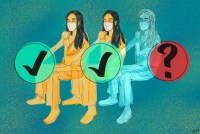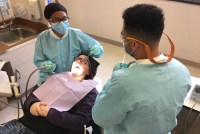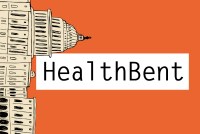Latest KFF Health News Stories
Trabajadores comunitarios de salud se están quedando sin fondos para ayudar a los más vulnerables
Los trabajadores comunitarios de salud son críticos para ayudar a los más vulnerables. Pero sus empleos están en peligro a medida que disminuyen los casos de covid.
‘The Danger Is Still There’ ― As Omicron Lurks, Native Americans Are Wary of Boosters
Federal data shows that vaccination rates for American Indians and Alaska Natives were some of the highest in the nation, but tribes say resistance has slowed efforts to boost members.
Despite Doctors’ Concerns, Pharmacists Get More Leeway to Offer Treatment With Testing
In the battle against covid, pharmacies became a key place for consumers to seek vaccines and testing. Some states are expanding pharmacists’ work to include directly prescribing drugs for customers who seek some routine, point-of-care tests, such as those for flu or strep throat. But doctor groups oppose the move.
Pandemic Funding Is Running Out for Community Health Workers
Illinois used federal pandemic money to hire community health workers who connect people with food banks and rental assistance programs, just like public health officials have long hoped to do. What will happen to the community trust that has been built up when the federal money runs out and the workers disappear?
Tennessee Offers to Expand Dental Schools as Medicaid Coverage Stretches Need
As states expand Medicaid’s dental benefits, they’re running up against a shortage of dentists willing to work on those patients, especially in rural communities. So Tennessee is helping dental schools expand and offering to pay off student loans for those who work in high-need areas.
Los retrasos en el diagnóstico y tratamiento del autismo aumentaron durante la pandemia
La pandemia retrasó muchos servicios médicos críticos, entre ellos los del autismo. Estos tratamientos son esenciales para los niños recién diagnosticados.
Reaction to the RaDonda Vaught Verdict: KHN Wants to Hear From Nurses
KHN is asking nurses and other medical professionals to weigh in on the conviction of RaDonda Vaught, a former Tennessee nurse who administered the wrong drug to a patient, killing her.
Covid and Schizophrenia: Why This Deadly Mix Can Deepen Knowledge of the Brain Disease
Recent studies from around the world have found that people with schizophrenia are as much as five times as likely to die from covid-19 as the general population. Scientists think the findings suggest schizophrenia is not just a disease of the brain, but also a disease of the immune system.
As Red States Push Strident Abortion Bans, Other Restrictions Suddenly Look Less Extreme
The Supreme Court’s conservative majority has yet to make clear its stand on Roe v. Wade. But state lawmakers aren’t waiting to consider a variety of extreme measures: bills that would ban abortions in cases of ectopic pregnancies, allow rapists’ families to object to terminating a victim’s pregnancy, or prohibit the procedure in the case of fetal disability. Do these proposals make the less extreme restrictions seem more mainstream?
Delays for Autism Diagnosis and Treatment Grew Even Longer During the Pandemic
Despite increased public awareness, research advances, and wider insurance coverage for autism therapies, children often wait months — in some cases more than a year — to get an autism diagnosis and begin intervention services. The waits can be longer for Black and Latino children, and families in rural areas are also disadvantaged, without access to providers.
‘American Diagnosis’: ‘Water Warriors’ Tap Diné Resilience to Increase Access on Navajo Land
Over decades, federal and state policies have left many tribal communities without access to clean, running water. This episode explores what separates some Diné and other Native people in the western United States from this critical resource.
Colorado Doubles Down on Abortion Rights as Other States — And the High Court — Reconsider
The Supreme Court is expected to overturn or weaken “Roe v. Wade.” If that happens, Colorado may become an abortion-access island, nearly surrounded by a sea of anti-abortion states. The state is bracing for impact, and advocates are trying to shore up its abortion defenses.
At a Tennessee Crossroads, Two Pharmacies, a Monkey, and Millions of Pills
Prosecutors say opioid-seeking patients drove hours to get their prescriptions filled in Celina, Tennessee, where pharmacies ignored signs of substance misuse and paid cash — or “monkey bucks” — to keep customers coming back.
Las sequías, las lluvias y el clima extremadamente cálido han creado la tormenta perfecta para que haya más mosquitos y más enfermedad.
‘An Arm and a Leg’: A Fight for the Right to Help
It’s illegal for a person who isn’t a lawyer to give even basic legal advice to people being sued for medical debt. Two New Yorkers are suing to change that.
Big Pharma Is Betting on Bigger Political Ambitions From Sen. Tim Scott
The South Carolina senator led the congressional pack in pharma campaign contributions for the second half of 2021. There are clear reasons.
Climate Change May Push the US Toward the ‘Goldilocks Zone’ for West Nile Virus
Colorado recently recorded the most West Nile virus deaths and cases of neuroinvasive infections in nearly two decades. Scientists warn that climate change will make conditions ripe for more West Nile transmission.
Journalists Recap Coverage of the Ongoing Pandemic and Lead Risks in Schools’ Drinking Water
KHN and California Healthline staff made the rounds on national and local media this week to discuss their stories. Here’s a collection of their appearances.
Nurse Convicted of Neglect and Negligent Homicide for Fatal Drug Error
RaDonda Vaught, a former nurse at Vanderbilt University Medical Center, could spend years in prison after being convicted of two felonies in Nashville, Tennessee, on Friday.
Senators Ask GAO to Examine Medicaid’s Low Covid Vaccination Rates
Sens. Robert Casey Jr. and Ron Wyden want a probe into what barriers are keeping Medicaid plans from reaching enrollees.























